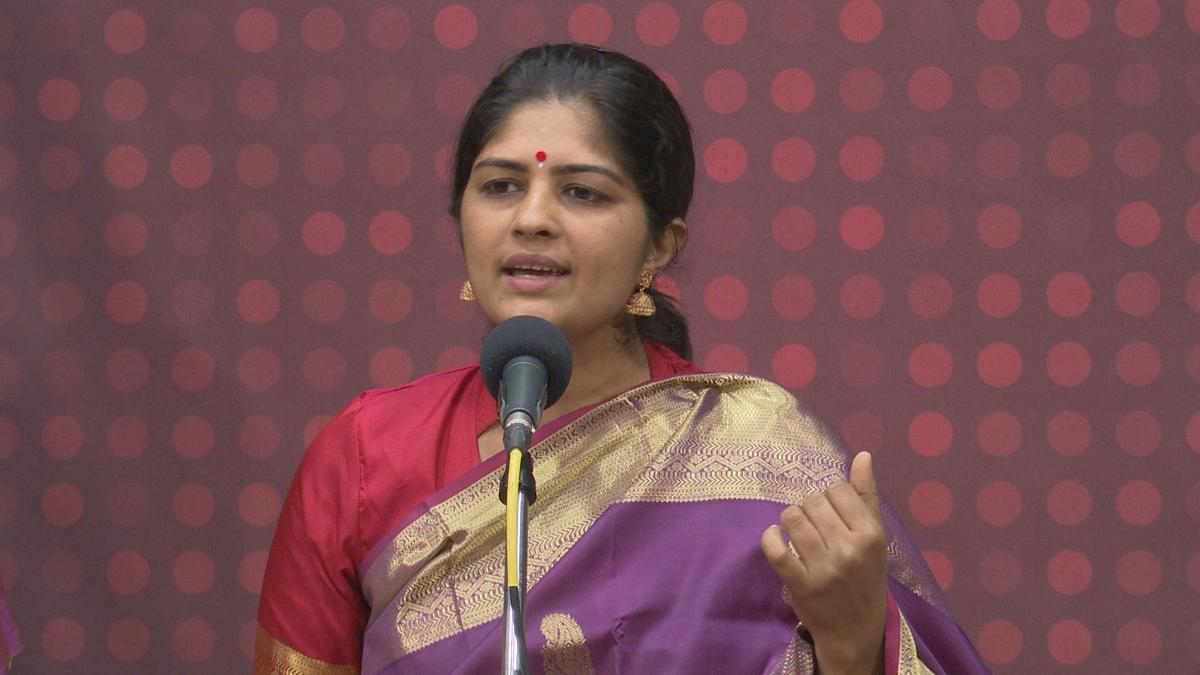
An exquisite celebration of Tamil contributions to Carnatic music was recently showcased at the Chitirai Isai Vizha 2024, orchestrated by Mudhra in collaboration with Nalli. Vocalists Prarthana Sai Narasimhan and R. Kashyap Mahesh each delivered two-hour concerts that delighted audiences with 21 Tamil compositions but notably stayed within the classical boundaries without venturing into avant-garde musical exploration. Their performances consistently entertained while maintaining an affinity for traditional appeal.
Over two consecutive weekends within the month-long festival dedicated to Tamil compositions, Prarthana and Kashyap infused freshness into the concert strands. Their selected works ranged from ancient hymns of the fifth to eighth centuries to compositions by artists who lived into the previous decade, underscoring the rich and enduring impact of the Tamil language on South Indian classical music. Prarthana’s concert commenced with the rare Sarasangi scale through T.K. Govinda Rao’s ‘Aanai mugane’, setting an unconventional starting note that was met by adept mridangam and morsing accompaniment, although the violin struggled to match the impromptu solfa sequences.
The subsequent Saveri composition unfolded at a slower pace, followed by Papanasam Sivan’s ‘Kumarantazh’ and ‘Senthil andavan’, with the latter taking the spotlight as the sub-main performance, joined by alapana and swaraprastara woven with finesse. ‘Enneramum’ by Gopalakrishna Bharatiyar acted as a prelude to the centerpiece Mohanam raga piece ‘Kapali’ (Papanasam), which was rendered with ebullient swara sequences and deft accompaniment.
Prarthana’s rendition of ‘Narahari vesha’ (Rukmini Ramani) and ‘Ennatavam’ in Kapi (Papanasam) continued to impress the audience, with Thondaradippodi Azhwar’s ‘Vandinam muralum’ in Thodi concluding the session. Trained by Mani Krishnaswami and Chingleput Ranganathan, Prarthana’s vocal delivery exuded sweetness with an inherent calmness, a quality unexpectedly shared with Kashyap, who was nurtured by the iconic T.V. Gopalakrishnan. Both vocalists displayed a measured approach to kalpanaswara, pleasing without overwhelming the listener.
Kashyap began his array of compositions with kalpanaswara, starting with a shlokam in Nattai, followed by Bharatiyar’s ‘Ganapati thaalai’. While the initial percussion accompaniment experienced synchronization issues, the ghatam and violin provided subtle support. The energy of the concert was elevated by Danadapani Desikar’s ‘Paadavendume’ in Hamasanadam raga and ‘Kadaikan’ by Ramaswami Sivan, featuring well-crafted geometric swara patterns.
A thorough alapana in Purvikalyani led to ‘Marukkulaviya’, and the devotional ‘Tirukuravadi nizhal’ rendered in nimble niraval form. Marimutha Pillai’s ‘Thillai chidambarame’ paved the way for the evening’s magnum opus in Madhyamavati—’Saravanabhava mukhane’ (Papanasam Sivan), marked by a reflective alapana and subtlety in the swaraprastara.
The closing numbers included a viruttam that traversed multiple ragas and concluded in Jhonpuri with ‘Andavan darisaname’ (Muthaiah Bhagavatar), followed by Guru Surajananda’s ‘Muruganin marupeyar’ (Bihag) and a thillana in Misra Sivaranjani (Maharajapuram Santhanam), culminating with Kulasekhara Azhwar’s ‘Mannupugazh’ (ragamalika).
This inspiring festival performance, reverberating with Tamil literary-artistic heritage, not only sustained the time-honored traditions of Carnatic music but also exemplified an artistic expression deeply embedded in cultural identity and linguistic pride.










